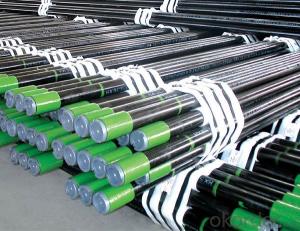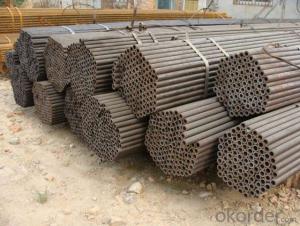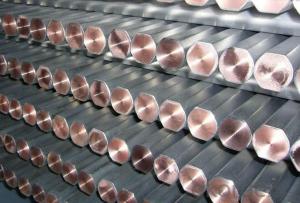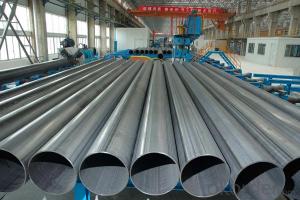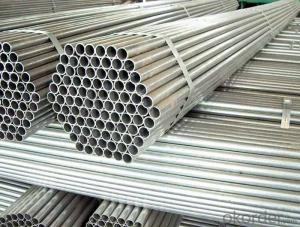Oil and Gas Steel Pipe API, ASTM, BS, DIN, GB, JIS
- Loading Port:
- Tianjin
- Payment Terms:
- TT or LC
- Min Order Qty:
- 20 m.t.
- Supply Capability:
- 15000 m.t./month
OKorder Service Pledge
OKorder Financial Service
You Might Also Like
1、Structure of Welded Steel Tube:
We are company that have many years experience and professional manager team and engineer team and sales team, sure we will provide you high quality of pipe and professioanl service.
Welded Steel Tube is formed by drawing a solid billet over a piercing rod to create the hollow shell. We are company that have many years experience and professional manager team and engineer team and sales team, sure we will provide you high quality of welded pipe and professioanl service.
2、Main Features of the Welded Steel Tube:
• High manufacturing accuracy
• The higher strength
• The small inertia resistance
• Strong heat dissipation ability
• Good visual effect
• Satisfy price
3、Welded Steel Tube Specification:
Standard | GB, DIN, ASTM ASTM A106-2006, ASTM A53-2007 |
Grade | 10#-45#, 16Mn 10#, 20#, 45#, 16Mn |
Thickness | 8 - 33 mm |
Section Shape | Round |
Outer Diameter | 133 - 219 mm |
Place of Origin | Shandong, China (Mainland) |
Secondary Or Not | Non-secondary |
Application | Hydraulic Pipe |
Technique | Cold Drawn |
Certification | API |
Surface Treatment | factory state or painted black |
Special Pipe | API Pipe |
Alloy Or Not | Non-alloy |
Length | 5-12M |
Outer Diameter | 21.3-610mm |
Grade | 20#, 45#, Q345, API J55, API K55, API L80, API N80, API P110, A53B |
Standard | ASME, ASTM |
1) Material:20#(ASTM A 106/A53 GRB.API5LGRB,GB),45#,16Mn,10#.
2) Specification range:OD:21.3-610mm,WT:6-70mm,length:6-12m or according to the requirement of clients.
3) Excutive standards:GB,ASME API5L.ASTM A 106/A53,Despite of the above standards,we can also supply seamless steel pipe with standard of DIN,JIS,and so on,and also develop new products according to the requirements of our clients!
4) Surface:black lacquered,varnish coating or galvanized.
5) Ends:Beveled or square cut,plastic capped,painted.
6) Packing:bundles wrapped with strong steel strip,seaworthy packing.
4、Packaging & Delivery
Packaging Details: | seaworthy package,bundles wrapped with strong steel strip |
Delivery Detail: | 15-30days after received 30%TT |
5、FAQ of Welded Steel Tube:
①How is the quality of your products?
Our products are strictly in accordance with international and domestic standard. We test on every pipe before delivery. Any quality certification or testing report you want to see, please tell us.
Guaranteed: If products’ quality is not in accordance with description as we provide or the promise before you place order, we promise 100% refund.
②How about the price?
Yes, we are factory and be capable of offering you the lowest price. One of our policy is that “ to save time and be absolutely honest with our business relationship, we quote as low as possible for every client, and discount can be given according to the quantity”, if you are interested in bargain and dissatisfy our factory price, just don’t waste your time. Our quotation is professional.
③Why should you choose us?
Choice happens because of our quality and price. Additionally, we can also offer professional products inquiry, products knowledge train (for agents), fast goods delivery, outstanding customer solution proposals. Our service formula: good quality + good price + good service=customer’s trust.
SGS test is available. Customer inspection before shipping is welcome. Third party inspection is OK.
6、 Welded Steel Tube Images:
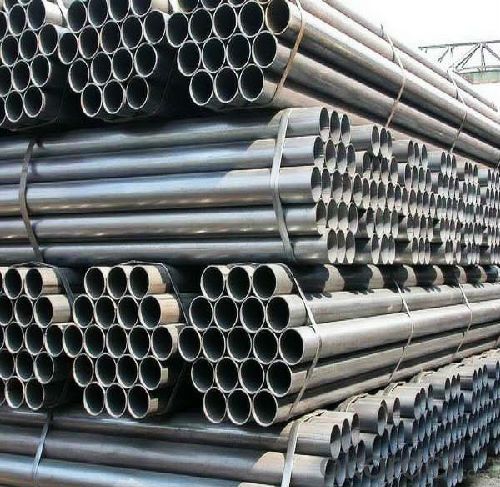
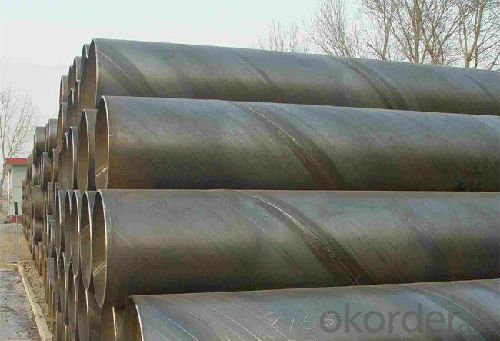
- Q: What is the average cost of steel pipes?
- The average cost of steel pipes can vary significantly depending on factors such as size, grade, and quantity needed. Therefore, it is difficult to provide a specific average cost without more information.
- Q: How does the price of steel pipes vary based on size and grade?
- The price of steel pipes varies based on their size and grade. Generally, larger pipes tend to have higher prices due to the increased amount of materials and manufacturing processes involved. Additionally, the grade of steel used in the pipes also affects the price, with higher-grade steel pipes being more expensive. This is because higher-grade steel offers better strength, durability, and corrosion resistance, making it suitable for specialized applications. Therefore, the price of steel pipes increases as both the size and grade increase.
- Q: How are steel pipes coated for insulation purposes?
- Steel pipes are commonly coated for insulation purposes through a process called external coating. This involves applying a layer of insulating material, such as polyethylene or epoxy, onto the surface of the steel pipe. The coating is carefully applied to ensure a uniform and continuous layer, which helps to prevent heat transfer and protect the pipe from corrosion.
- Q: What is the difference between carbon steel and alloy steel pipes?
- Carbon steel pipes and alloy steel pipes are two distinct types of steel pipes, characterized by their composition and properties. Carbon steel pipes, consisting mainly of carbon and iron, incorporate small quantities of other elements such as manganese, silicon, and copper. These pipes are renowned for their robustness and durability, making them a favored option in industries like construction, oil and gas, and automotive. Carbon steel pipes are relatively low-priced and exhibit commendable resistance to corrosion. In contrast, alloy steel pipes are produced by introducing additional alloying elements to carbon steel. These alloying elements encompass chromium, nickel, molybdenum, vanadium, and others. The incorporation of these elements augments the steel's properties, resulting in increased strength, superior corrosion resistance, and enhanced heat resistance. Alloy steel pipes are commonly employed in applications involving high temperatures and pressures, such as power plants, refineries, and chemical plants. Regarding cost, alloy steel pipes generally incur higher expenses compared to carbon steel pipes due to the inclusion of supplementary alloying elements. Nevertheless, the added advantages in terms of performance and longevity often justify the elevated cost. To summarize, the primary distinction between carbon steel and alloy steel pipes lies in their composition and properties. Carbon steel pipes primarily consist of carbon and iron, while alloy steel pipes contain additional alloying elements to enhance their properties. Carbon steel pipes are celebrated for their strength and affordability, whereas alloy steel pipes offer improved strength, corrosion resistance, and heat resistance.
- Q: What is an electric welded pipe (EFW)? Seek help!
- According to the operation requirements of the electric welding machine, connect the lead wire and set up the proper welding parameter of the electric welding machine, which can be operated by manual or automatic two input methods.After checking, start the electric welding machine and enter the welding process. When the welding time is reached, the machine will automatically enter the cooling state.When the pipe completely removed after cooling, electric fusion welding machine.Cutting the pipe with the cutting tool of plastic pipe or fine toothed saw with cutting guide device, and making its end face perpendicular to the axis of pipe. Remove the edges of the edges with a knife, scrape the weld area in the pipe or spigot end and clean the weld area.Should use the special fixture as far as possible to secure the components to be connected, and the roundness of the pipe shall not exceed 1.5% of the outer diameter of the pipe, or it should be corrected on the corresponding fixture.
- Q: Can steel pipes be used for transporting gases and liquids?
- Yes, steel pipes can be used for transporting both gases and liquids. Steel pipes are highly durable, corrosion-resistant, and have excellent strength, making them suitable for various applications, including oil and gas pipelines, water supply systems, and industrial processes.
- Q: Can steel pipes be used for conveying gases?
- Indeed, gases can be conveyed using steel pipes. In different industries, such as oil and gas, petrochemical, and construction, steel pipes are commonly employed to transport a wide range of gases, including natural gas, air, and hydrogen. The use of steel pipes for gas transportation offers numerous benefits. They possess exceptional strength and durability, enabling them to withstand rigorous pressure and temperature conditions. Moreover, steel pipes exhibit remarkable resistance to corrosion, effectively preventing gas leakage and ensuring the safety and dependability of the gas transportation system. Furthermore, their smooth internal surface minimizes frictional resistance, facilitating efficient gas flow. As a result, steel pipes are a reliable and extensively-utilized choice for conveying gases across diverse applications.
- Q: How are steel pipes used in the manufacturing of machinery?
- Steel pipes are used in the manufacturing of machinery for various purposes such as conveying fluids, gases, or materials, as structural components, and for heat transfer. They provide durability, strength, and resistance to corrosion, making them suitable for applications where high pressure, temperature, or heavy loads are involved.
- Q: What are the common welding techniques used for steel pipes?
- The common welding techniques used for steel pipes include Shielded Metal Arc Welding (SMAW or stick welding), Gas Metal Arc Welding (GMAW or MIG welding), Flux-Cored Arc Welding (FCAW), and Gas Tungsten Arc Welding (GTAW or TIG welding).
- Q: What are the different types of coatings used on steel pipes?
- Steel pipes can be coated with various types of coatings to increase their durability and protect them from corrosion. Some commonly used coatings are: 1. Fusion-Bonded Epoxy (FBE) Coating: The steel pipe is heated and the epoxy powder is melted and fused to the surface. FBE coatings offer excellent corrosion resistance and are widely used in water pipelines and the oil and gas industry. 2. Polyethylene (PE) Coating: Similar to FBE coatings, PE coatings are applied to steel pipes. They provide a protective layer that is resistant to moisture, chemicals, and abrasion. PE coatings are commonly used in gas pipelines and underground water pipelines. 3. Polypropylene (PP) Coating: PP coatings have similar application processes and protective qualities as PE coatings. However, they offer enhanced resistance to higher temperatures, making them suitable for chemical processing plants and refineries. 4. Concrete Weight Coating (CWC): This special coating involves applying a layer of concrete to the steel pipe. It adds weight to the pipe, making it more stable and resistant to buoyancy in underwater or submerged applications. 5. Zinc Coating: Zinc coatings, such as hot-dip galvanizing, involve immersing the steel pipe in molten zinc. This creates a protective layer of zinc on the pipe's surface, offering excellent corrosion resistance. Zinc coatings are commonly used in outdoor applications, such as fencing, guardrails, and water pipelines. 6. Bituminous Coating: Bituminous coatings involve applying a layer of bitumen or asphalt to the steel pipe. They provide excellent resistance to water and chemicals, making them suitable for underground pipelines and structures. These examples illustrate the variety of coatings available for steel pipes. The choice of coating depends on factors like the intended application, environmental conditions, and desired level of corrosion resistance.
Send your message to us
Oil and Gas Steel Pipe API, ASTM, BS, DIN, GB, JIS
- Loading Port:
- Tianjin
- Payment Terms:
- TT or LC
- Min Order Qty:
- 20 m.t.
- Supply Capability:
- 15000 m.t./month
OKorder Service Pledge
OKorder Financial Service
Similar products
Hot products
Hot Searches
Related keywords
